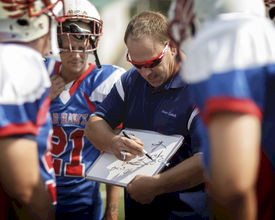From analyzing the event goals with our clients to negotiating the collaboration terms with our suppliers, we end up scheduling a crazy amount of planning or event marketing meetings. This dynamic ensures an efficient communication and excludes possible misunderstandings that can happen via email discussions.
However, one crucial meeting can influence the outcomes of multiple months of work. The pre-event briefing is the last meeting your team and volunteers must have before the event starts. It's usually held one day before the event and it revolves around the last-minute details and the onsite dynamics.
Although many of the things you must discuss during the pre-event briefing have already been set up and decided a long time ago, it’s important to agree on the action plan and onsite tasks each team member will have. Here's a list of topics you should definitely review during the pre-event meeting:
1. Layout of entrances and the check-in procedure
Obviously, this aspect must be discussed when designing the event so you can prepare the procedure accordingly (through automatic via QR codes, a desk where the assistants will receive additional information, ...).
However, during the pre-event briefing meeting, you must set up the entire dynamic plus designate team members. You must decide how many people will be at the receiving desk, who'll be in charge of what (for example, one person could scan the QR code, while another person handed out the goody bags). By discussing this one day in advance, your team members and volunteers will know exactly what they have to do on the morning of the event, which will speed up the entire procedure and make check-in run smoothly for your attendees.
2. Parking and access
Will the attendees be traveling via public transportation or in cars? Will your speakers need parking access? Did you discuss this with the venue security in advance? To avoid unpleasant surprises, you must review this final detail during the pre-event briefing and then take the necessary measures to ensure a friendly flow and attendee reception.
3. The protocol for important guests
Although it’s not the case for all events, there are events when you'll expect high-rank individuals. From government members to mayors or influential figures, you'll have to prepare your team for receiving these important guests. At the pre-event meeting, discuss who will take care of these guests and accompany them during the entire event (if these guests have requested full-time assistance).
If you are receiving international, high-rank guests, you may want to discuss with the protocol cabinet of a local important figure about the possibility of inviting that person to receive the high-level guests. If these important figures are participating in the opening activity, it’s crucial to agree upon their location and speaking order during the dynamic. You must finalize these details during the pre-event meeting.
4. Onsite task distribution
There’s no shortage of activities and tasks an event team must handle during an event. Be it the check-in, control of the room doors, or overseeing the translation headphones, you must organize an efficient workflow. That's why it's essential to discuss and confirm the onsite task distribution during the pre-event briefing meeting.
5. Volunteer management
Usually, the person responsible for the volunteer activities needs to schedule a pre-event briefing meeting just for them. This meeting should cover onsite task distribution, as well as answer any questions the volunteers may have and determine the dress code and meeting time on the morning of the event.
6. Plan B
In some cases, you may not be sure about the outcome of certain activities, or you may have doubts about unconfirmed issues. For example, you may not be sure if a speaker will be on time, since there's a chance the airplane operators' strike will continue on the day of the event. In this case, during the pre-event briefing meeting, you must plan a second option for these issues.
7. Emergency contacts
Another important topic is defining a list of emergency contacts and sharing that list with your team members and volunteers. Make sure everyone has access to these important phone numbers.
Wrap up
The pre-event briefing meeting is one of the most important settings that define the planning process itself. Being a meeting for the last-minute details and onsite task distribution, it's crucial to discuss all the doubts and questions your team members or volunteers may have. After the briefing, everyone must know their tasks on the day of the event and what their responsibilities are in case they have to switch to plan B. Good luck!







